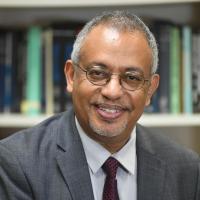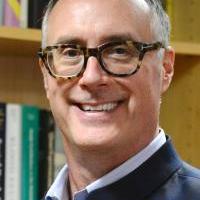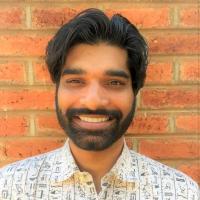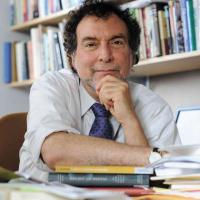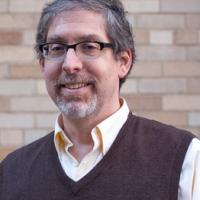Faculty and Staff
Leadership
Kiros Berhane, PhD
- Director, C-ARCH
- Chair of Biostatistics
- Cynthia and Robert Citrone-Roslyn and Leslie Goldstein Professor of Biostatistics
Dr. Kiros Berhane is the Cynthia and Robert Citron-Roslyn and Leslie Goldstein Professor and Chairman of the Department of Biostatistics at the Mailman School of Public Health, Columbia University. He received his BSc in Statistics and Mathematics from Addis Ababa University (Ethiopia), MS in Statistics from University of Guelph (Canada), and PhD in Biostatistics from University of Toronto (Canada). He completed a postdoctoral fellowship at Johns Hopkins University (USA). He is a widely published international expert on development of statistical methods with focus on complex and correlated data structures, as well as their application into a wide range of public health topics – with special focus on health impacts of environmental factors and climate change. Prior to joining Columbia in January 2020, Dr. Berhane was Professor and Director of Graduate Programs in Biostatistics and Epidemiology at the University of Southern California. He has served on several national and international advisory and review panels, including committees of the Institute of Medicine (US National Academies), the US-EPA Science Advisory Board, Health Effects Institute Review Committee, Health Effects Institute Global Oversight Committee, science advisory panel of the Western Interprovincial Scientific Studies Association (WISSA - Calgary, Canada) and the Biostatistical Methods and Research Design [BMRD] Study Section of the National Institutes of Health. He served as a member of (and chaired for one of the years) the Fisher lecture and Award selection committee of the Committee of Presidents of Statistical Societies (COPSS). He is currently serving as a member of the committee of the National Academy of Science, Engineering and Medicine (NASEM) on Assessing Causality from a Multidisciplinary Evidence Base for National Ambient Air Quality Standards and also as a member of the core panel for Lancet Commission on the Future of Health and Economic Resilience of Africa (FHERA). In addition to serving on the editorial boards of several scientific journals, he is also currently serving as a member of Science magazine's Board of Reviewing Editors He was a Fulbright Scholar in 2016-2017. He is an elected fellow of the American Statistical Association.

Darby Jack, PhD
- Co-Director of C-ARCH
- Professor of Environmental Health Sciences
Dr. Darby Jack studies environmental health risks in developing countries, the health impacts of climate change, and the role of the urban environment in shaping health. For the last several years his primary focus has been the health effects of exposure to indoor air pollution from biomass fuels. With support from the Center for Environmental Health in Northern Manhattan, he has helped to develop a Columbia-wide biomass working group, which coordinates and supports interdisciplinary research on the topic. These collaborations have given rise to current efforts to measure the health benefits of clean cookstoves in Ghana, Kenya, and India. He holds a Ph.D. from Harvard University and an undergraduate degree from Williams College.

Center Members
Gary Belkin, MD, PhD
- Director, Billion Minds Project, Mailman School of Public Health
A psychiatrist who approaches mental health as a building block of social policy and progress, he recently founded Billion Minds as a “think-action tank.” The intention of Billion Minds is to link mental health to problems of great scale, specifically to the climate crisis, and to safeguarding sustainable societies through a humane social climate. COP2 was one outcome of that work—a global network aligned about converging growing activity and learning on climate-psychological resilience connections and putting them to global scale. An initial effort from that is to produce an implementation Roadmap for the UNFCCC Race to Resilience to incorporate the goal of building capacity to promote those supports to 4 billion people by 2030. Gary is also the former Executive Deputy Commissioner in the New York City Department of Health and Mental Hygiene where he led the Division of Mental Hygiene and its development and implementation of the innovative NYC-wide public mental health initiative, ThriveNYC. Before joining city government, he was Medical Director for Behavioral Health across the Health and Hospitals Corporation of the City of New York, and served as Founding Editor in Chief of the open access journal Global Mental Health.

Daniel Belsky, PhD
- Associate Professor of Epidemiology (in the Robert N. Butler Columbia Aging Center)
Daniel Belsky, PhD, is an Associate Professor of Epidemiology in the Mailman School of Public Health (Department of Epidemiology and Robert N Butler Columbia Aging Center) at Columbia University Irving Medical Center (CUIMC).
In his research, Dr. Belsky aims to reduce social inequalities in aging outcomes in the US and elsewhere. His research sits at the intersection of public health, population & behavioral science, and genomics. His studies seek to understand how genes and environments combine to shape health across the life course. Using tools from genome science and longitudinal data from population-based cohort studies and randomized trials, he aims to identify targets for policy and clinical interventions to promote positive development and extend healthspan. Dr. Belsky received his PhD in Health Policy & Management from the Gillings School of Public Health, University of North Carolina at Chapel Hill and completed his postdoctoral training at the Center for the Study of Aging and Human Development, Duke University Medical Center.

Mark Bittman
- Lecturer in Health Policy and Management
Mark Bittman, a leading voice in global food culture and policy for more than three decades, is the author of the How to Cook Everything series, and Animal, Vegetable, Junk: A History of Food from Sustainable to Suicidal, which The New York Times called “epic and engrossing.” Bittman spent three decades at the Times, where he created “The Minimalist,” was the Sunday Magazine’s lead food writer, and became the country's first weekly opinion writer at a major publication to concentrate on food. Bittman is currently the editor-in-chief of The Bittman Project, which sponsors a newsletter, website, and the podcast “Food, with Mark Bittman.” He is a on the faculty of Columbia's Mailman School of Public Health, and the founder of Community Kitchen, which describes as, “the most important project I’ve ever tackled.” He lives in Philipstown, New York, with his partner Kathleen Finlay.

Amelia K. Boehme, PhD, MSPH
- Adjunct Assistant Professor of Epidemiology
Dr. Boehme received her PhD in epidemiology from the University of Alabama at Birmingham, and completed a T32 fellowship in Neuroepidemiology from Columbia University under the mentorship of Dr. Mitchell Elkind. Dr. Boehme joined the Columbia university faculty at the end of 2015 where she is Assistant Professor of Epidemiology in Neurology.
Dr. Boehme’s research focuses on the role infections and inflammation have on stroke risk, and the role of inflammation post-stroke on stroke outcomes. Additionally, she explores the health disparities in these relationships. Dr. Boehme co-teaches the Neuroepidemiology course in the Mailman School of Public Health with Dr. Mitchell Elkind.
In addition to her research Dr. Boehme has developed the NeuroCORPS Research Training Initiative. This training program is a cross collaboration between the Mailman School of Public Health and the Department of Neurology, where students and trainees from each school are paired together in a mentored environment in a mutually beneficial collaboration. This training initiative allows trainees to become more involved in neurologic clinical and population research and encourages cross-collaboration and productivity. Each pairing brings a unique set of skills in methods, analyses, and clinical content whereby the methods students learn more about the clinical components of population research, and the clinical trainees learn more about study design, methodology, and statistical concepts.

Thomas Briese, PhD
- Associate Professor of Epidemiology (in the Center for Infection and Immunity)
Dr. Briese's research interests include the molecular epidemiology of emerging viral diseases, virus-host cell interactions, and innovative approaches to pathogen diagnosis and discovery. He obtained his scientific education at the Free University Berlin, the Max Planck Institute for Molecular Genetics, and the University of California at Irvine. He pioneered state-of-the-art methods in molecular biology to study the involvement of infectious agents in chronic and neuropsychiatric diseases, as well as in acute diseases. Dr. Briese was responsible for cloning the genome of Borna disease virus, a novel infectious agent potentially linked to some mental disorders. His achievements have been recognized by receipt of an Albertson Young Investigator Award from the National Alliance for Research on Schizophrenia and Depression. Another successful application of these powerful molecular techniques was the identification of the flavivirus responsible for the New York City encephalitis epidemic in 1999. In 2003, Dr. Briese participated in the investigation of the SARS epidemic, during which he visited and collaborated with Beijing research institutions by invitation of the Chinese Ministry of Science and Technology. He also served as an adviser to WHO. Current research efforts include the advancement of molecular detection tools for the rapid identification of potential bio-threat agents. In addition, Dr. Briese is involved in multi-center and birth cohort studies using molecular methods to assess the potential role of infection in disorders such as autism and schizophrenia.

Merlin Chowkwanyun, PhD, MPH
- Donald H. Gemson Assistant Professor of Sociomedical Sciences
Merlin Chowkwanyun's work centers on the history of community health; environmental health regulation; racial inequality; and social movement/activism around health.
He just finished a book called All Health Politics is Local: Battles for Community Health in the Mid-Century United States, which will be published by UNC Press. He is working on another book on political unrest at medical schools and neighborhood health activism during the 1960s and 1970s.
Chowkwanyun is also the PI (co-PI David Rosner) on a recent National Science Foundation Standard Research Grant for ToxicDocs.org, a depository of millions of pages of once-secret documents on industrial poisons.
He teaches courses on health advocacy and mixed methods, and in the CORE, co-teaches the social determinants module.
He is most proud of the two teaching awards he has won at Mailman for Excellence in Teaching and Innovation in Teaching and is a loud and annoying Los Angeles Lakers fan.

Maya Deyssenroth, PhD
- Assistant Professor of Environmental Health Sciences
Maya Deyssenroth is a molecular epidemiologist with a focus on studying pathways through which the placenta conveys intrauterine exposures on postnatal health outcomes. Within this research scope, Dr. Deyssenroth incorporates biostatistical and bioinformatic tools to evaluate multi-pollutant exposures and high dimensional genomic profiles to elucidate signatures reflective of early life programming of health and disease.

Pam R. Factor-Litvak, PhD
- Professor of Epidemiology at the Columbia University Medical Center
Along with an interdisciplinary group of scientists including dental scientists, toxicologists, neuropsychologists and neurologists, Dr. Factor-Litvak is studying the associations between inorganic mercury exposure, derived from dental restorations, and neurological and neuropsychological function in a large group of adults. This study is the first large epidemiological investigation of the health effects of dental amalgams and is of great public health significance since policy decisions are likely to be based on these data. Dr. Factor-Litvak also studies the effects of exposure to lead on pregnancy outcomes and childhood development. As part of multi-disciplinary team of the Yugoslavia Pb study, she has focused on the effects of lead on childhood growth, development, and blood pressure and renal function. Small adverse associations have been found in this (and other cohorts); this cohort is currently being followed to determine the persistence of these associations. Environmental contaminants are currently of interest in the study of infertility and other impediments to normal reproduction. As the epidemiologist for the National Reproductive Medical Network, a collaborative effort of 8 sites across the country, Dr. Factor-Litvak is exploring associations between environmental exposures and outcomes such as response to treatment for infertility, semen parameters, ectopic pregnancy and recurrent spontaneous abortion. Dr. Factor-Litvak's other interests are in the development of epidemiological methods important for environmental studies, such as missing data on exposure and outcome, biased selection of study subjects and the extrapolation of data from ecologic studies to individuals.

Linda P. Fried, MD, MPH
- Dean of the Mailman School of Public Health
- DeLamar Professor of Public Health
- Professor of Epidemiology and Medicine
Linda P. Fried, MD, MPH, is Dean of Columbia University Mailman School of Public Health since 2008. She additionally serves as Senior Vice President of Columbia University Irving Medical Center, and Director of the Robert N. Butler Columbia Aging Center, a university-wide center housed in the Mailman School. Dean Fried leads one of the three original schools of public health in the U.S., having just marked its Centennial. Columbia Mailman is dedicated to conducting the science and creating knowledge as to how to prevent disease, disability and injury, and improve the health of populations, both around the corner and around the world, as well as educating students, professionals, and the public, and partnering with all sectors of society towards the goal of a healthy population. Under her leadership as Dean, Columbia Public Health is recognized as the leading innovator in public health education and has led the investment in next-century programs and leadership. Among the School's many ground-breaking initiatives are the interdisciplinary Center on Climate Change and Health, the Butler Columbia Aging Center, centers on child health and wellbeing, the injury center that is developing knowledge needed for preventing gun violence. The School's innovative programs address global mental health, define public health systems for the future, and create next-generation approaches to pandemic prevention, health in the context of forced migration, sexual and reproductive health, preventing maternal mortality, and data science for health are among the School's many ground-breaking programs. The Mailman School is providing essential knowledge for the second century of public health: how to most effectively prevent ill health, optimize health for all and extend all of our health spans across our now-longer lives, and protect human health in the face of climate change, food insecurity, rising rates of pandemics, and the challenges of environmental threats to our health.
Dr. Fried is a physician expert in geriatric medicine and an internationally renowned population scientist. She has dedicated her career to the science of healthy longevity, including defining frailty as a clinical syndrome and illuminating its causes, and defining the causes and consequences of cardiovascular disease and multimorbidity, loneliness and disability in aging. Her work has contributed to knowledge as to the bases for a world where greater longevity benefits people of all ages. To that end, she is the co-designer and co-founder of Experience Corps. This community-based senior volunteer program places older adults in public elementary schools in roles that support both the academic success of all children and the health and wellbeing of the volunteers, and it is an evidence-based public health program. Dr. Fried has proposed the concept that it is possible to create a Third Demographic Dividend that enables society and individuals of all ages to experience the benefits of our now-longer lives through a life-course approach to prevention—to extend health span and transform society's social infrastructure to enable meaningful and significant roles for older adults. She has served as a member of the global think tank, the 'Aging Society Network', since 2006. With the goal of creating and distilling the science base for successful societies of longer lives, she co-chaired the 2022 National Academy of Medicine report, Global Roadmap for Health Longevity.
Prior to becoming Dean, Dr. Fried was the Mason F. Lord Professor of Geriatric Medicine at the Johns Hopkins Medical Institutions, where she was the founding Director of the Center on Aging and Health, the center of excellence for aging research, and Director of the Division of Geriatric Medicine and Gerontology. She was the principal investigator of major longitudinal cohort studies, including the NIH-funded Cardiovascular Health Study and the Women's Health and Aging Studies I and II, of the Older Americans' Independence Center, and randomized controlled trials, including the Experience Corps Trial and the GEM trial of Gingko Biloba for prevention of cognitive decline. She was the founding Chair of the Johns Hopkins Department of Medicine Task Force on the Academic Careers of Women in Medicine (1989-95) and chaired the University President's Task Force on the Status of Women in Academic Careers (1998-2003).
Dr. Fried is the author of over 500 peer-reviewed articles. She is an elected member of the U.S. National Academy of Medicine since 2000, and currently serves as a re-elected member of its Executive Council. Elected to the Association of American Physicians in 2003, she served as its President from 2016-17. She was a member of the Council of the National Institute on Aging, served as a member of the World Economic Forum's Global Agenda Council on Aging (2006-18), its Council on Longevity, and co-chaired its Council on Human Enhancement. Dean Fried is an elected member of the Council on Foreign Relations. She was named among the top 1 percent "most influential scientific minds of the past decade" by Thomson-Reuters in 2014, and by The New York Times as "one of 15 world leaders in science" in 2012. She is the recipient of numerous honors and awards, including, most recently, the 2022 George M. Kober Medal of the Association of American Physicians; Nicholas Murray Butler Medal, Columbia University; Crain's New York Health Care Notable; Politics New York Power Players in Health Care; and 2023 Knight of the Legion of Honour, Government of France.

Jeff Goldsmith, PhD
- Associate Professor of Biostatistics
For several years, Jeff Goldsmith has worked to advance the state-of-the-art in functional data analysis by developing methods for understanding patterns in large, complex datasets in neuroscience, physical activity monitoring, and other areas.
Working closely with clinicians and neuroscientists around the world, he and his collaborators have focused on improving the understanding skilled movements. This work involves reaching movements made by stroke patients: in these experiments, a patient's fingertip position is recorded hundreds of time per second for the duration of the reach. Dr. Goldsmith has developed new statistical methods to understand the impact of stroke on movement quality, and applied these to large, longitudinal datasets. In parallel, he has proposed methods for wearable device research, especially focusing on accelerometers. These devices can produce minute-by-minute (or even finer) resolution observations of activity for hundreds of participants over several days, weeks, or months. The methods developed include approaches for regression with activity trajectories as outcomes; for interpretable dimension reduction; and for aligning major patterns (like wake from sleep, mid-day dips in activity, and sleep onset) across subjects.
Dr. Goldsmith has worked to incorporate data science techniques for transparency and reproducibility into biostatistical analyses. Research projects are accompanied by robust, publicly available software and analytical pipelines that ensure the reproducibility of the results. This approach is informed by his work in teaching data science.
M. Claire Greene, PhD, MPH
- Assistant Professor of Population and Family Health
M. Claire Greene, PhD MPH, is an epidemiologist and implementation scientist interested in identifying opportunities to improve mental health and psychosocial wellbeing among forcibly displaced populations through multisectoral and community-based interventions. In her work she consults and collaborates with governments, non-governmental organizations, UN agencies, and academic institutions. At Mailman, Dr. Greene teaches Investigative Methods in Complex Emergencies, a course focused on how to collect and effectively use data to inform programming and policy in humanitarian emergencies, and a course on Psychosocial and Mental Health Issues in Forced Migration.
![]()
Julie Herbstman, MSc, PhD
- Professor of Environmental Health Sciences
Trained as an epidemiologist, Julie Herbstman's research focuses on the impact of prenatal exposures to environmental pollutants, including polybrominated diphenyl ethers (PBDEs) and polycyclic aromatic hydrocarbons (PAHs) on child growth and development. She has also been involved in research exploring the long-term environmental health impact of exposure to pollutants from the collapse of the World Trade Center on 9/11. She is the director of the Columbia Center for Children's Environmental Health, where she oversees longitudinal birth cohort studies in New York City. Her work also involves the integration of epigenetic biomarkers to explore the mechanistic pathway between prenatal exposures and disease risk.
![]()
Diana Hernandez, PhD
- Associate Professor of Sociomedical Sciences
Dr. Diana Hernandez conducts research at the intersection of energy, equity, housing and health. A sociologist by training, her work examines the social and environmental determinants of health and has studied the impacts of policy and place-based interventions on the health and well-being of socioeconomically disadvantaged populations. Her foundational research on energy insecurity- defined as the inability to adequately meet household energy needs- has explored the multiple dimensions of this phenomenon identifying sociodemographic disparities, adverse consequences and promising interventions toward energy equity and justice. Much of her community-oriented research has been done in collaboration with community groups and government agencies around the country, including in the South Bronx, where she has led small-scale housing redevelopment projects. Dr. Hernandez has published over 75 peer-reviewed articles and book chapters in leading academic journals such as Social Science & Medicine, Journal of Urban Health and Energy Policy. Her work been funded by the National Institutes of Health, the Department of Housing and Urban Development, and the JPB, Robert Wood Johnson, and Alfred P. Sloan Foundations, among others. Professor Hernandez teaches graduate level courses on qualitative research methods, design and analysis; public health leadership; and energy justice. She is a Mayoral Appointee to NYC's Environmental Justice Advisory Board. Dr. Hernandez has written for and been featured in various media outlets including the NY Times, USA Today, BBC, NY Daily News and CityLab. Her first book about energy insecurity in the US is due to be published in 2024.
![]()
Markus Hilpert, PhD
- Associate Professor of Environmental Health Sciences
I am an expert in environmental pollutant transport working at the interface between environmental engineering, hydrology and environmental health. Earlier in my career, my research focused on multiphase flow and emergent contaminant transport in subsurface environments. In recent years, however, my research has focused increasingly on the public health implications of environmental contamination. My research agenda now also addresses adverse health effects of electronic cigarettes, chronic volatile organic compound (VOC) releases from gas stations, and traffic-related air pollution.

S. Patrick Kachur, MD, MPH
- Professor of Population and Family
Patrick Kachur is a public health physician with more than 30 years of experience in global health practice. He completed clinical and residency training at the Mary Imogene Bassett Hospital and Johns Hopkins University and a community health fellowship at the University of Ilorin in Nigeria. For much of his career he was based at the Centers for Disease Control and Prevention where he held leadership roles in the Malaria Branch and Center for Global Health, receiving the agency's highest service award. His scholarship has focused on experimental and observational epidemiology and health systems studies examining the effectiveness and equity of malaria and child health interventions, with an emphasis on real world research that shapes policies and programs. He contributed to interdisciplinary research establishing the efficacy of insecticide-treated nets in western Kenya and the feasibility and impact of routine use of artemisinin-based combination therapy in Tanzania. In 2016, he was appointed by the Director General of the World Health Organization to serve on the Malaria Policy Advisory Group. Patrick joined the faculty in 2018, where he coordinates implementation science partnerships with a focus on expanding access to quality global health programs and services. He teaches courses on Malaria Program Planning; Applications of Implementation Science in Low- and Middle-Income Countries; and Planning, Managing and Communicating for Evidence-Based Public Health and contributes to the school-wide Integration of Science and Practice.

Mahesh V. Karra, ScD
- Associate Professor of Population and Family Health
I am an Associate Professor of Population and Family Health at Columbia University’s Mailman School of Public Health and the Director of the Program on Women’s Empowerment Research (POWER). I was also an Alexander von Humboldt Fellow at the University of Göttingen’s Center for Modern Indian Studies from 2024-2025. My academic and research interests are broadly in development economics, health economics, quantitative methods, and applied demography. My research utilizes experimental and non-experimental methods to investigate the relationships between population, health, and economic development in low- and middle-income countries. I have conducted field work in Sub-Saharan Africa, South Asia, and Latin America, and my current research uses randomized controlled trials to evaluate the health and economic effects of improving access to family planning and maternal and child health services in Malawi, India, Nepal, Sri Lanka and Tanzania. I have also worked for the Population Reference Bureau and the Futures Group International and served as a consultant to the World Bank, the World Health Organization, and the Population Council. I am also a Co-Editor of Studies in Family Planning, a quarterly peer-reviewed academic journal that publishes articles on public health, social science, and biomedical research on sexual and reproductive health, fertility, and family planning.

Norman Kleiman, PhD, MS
- Associate Professor of Environmental Health Sciences
Dr. Kleiman works at the intersection of public health, radiation research and ophthalmology, often using the eye as a model system to study the effects of environmental exposures, and radiation in particular, on human and animal health. For example, NASA and DOE funded research projects were designed to better understand ocular risks, and radiation cataract in particular, underlying eye exposure to low doses of different kinds of radiation, e.g. X-rays and high energy space radiation, (think cosmic rays). Related human research in Dr. Kleiman's laboratory estimates relative risk of radiation cataract in medical professionals such as interventional cardiologists and associated nursing personnel following occupational exposure to X-ray during fluoroscopic imaging procedures. A collaborative study with Ukrainian colleagues examines ocular radiation risk in Chornobyl accident cleanup workers. Recently, new projects have examined health risks posed by exposure to radiation, heavy metals and other environmental hazards in mice, voles and semi-domesticated dogs living within the Chornobyl exclusion zone. In other areas related to eye pathology, a NIEHS funded project investigates the potential relationship between arsenic exposure and cataract and recently reported significantly elevated arsenic concentrations in eye tissue. A recently funded NIEHS study examines the potentially carcinogenic heavy metal risks associated with e-cigarette use. At a mechanistic level, Dr. Kleiman applies molecular and biochemical approaches to examine how environmental toxins such as radiation, heavy metals or e-cigarette use causes DNA damage, misrepair and mutagenesis and how individual genetic determinants influence risk. Overall, these investigations help in formulating appropriate risk policies and aid in development of human exposure guidelines as well as having important therapeutic implications for radio- and/or chemo-sensitive subsets of the human population. Among other responsibilities, Dr. Kleiman is a technical cooperation expert for the International Atomic Energy Agency and serves on scientific committees of the National Council on Radiation Protection (NCRP) and the International Commission on Radiological Protection (ICRP).

Kim Knowlton, DrPH
- Senior Scientist at National Resource Defense Council
- Assistant Clinical Professor of Environmental Health Sciences
- Chair of Global Climate Change and Health Topic Committee of American Public Health Association
Dr. Kim Knowlton’s research focuses on the health effects of climate change; advocating for strategies to prepare for and prevent these impacts, especially for our most vulnerable communities; and making health a more central feature of national, state, and local climate change adaptation plans. She has researched heat- and ozone-related mortality and illnesses; connections between climate change, pollen, allergies and asthma, as well as infectious diseases like dengue fever; the health costs of climate change; and domestic and international climate-health preparedness strategies. She holds a Master’s degree in Environmental and Occupational Health Sciences from Hunter College, and received her Doctorate in Public Health from Columbia University.

Zhonghua Liu, ScD
- Assistant Professor of Biostatistics
Dr. Zhonghua Liu obtained his doctorate in Biostatistics from Harvard University advised by Professor Xihong Lin. His current research interests include causal inference, semiparametric efficiency theory, machine (deep) learning theory and applications, statistical genetics/genomics, causal mediation analysis, Mendelian randomization.

Nischay Mishra, PhD
- Assistant Professor in Epidemiology
Dr. Mishra is a virologist and molecular biologist with over 10 years of experience in high throughput sequencing, viral metagenomics, serology, viral epidemiology, diagnostics and bioinformatics. His achievements include the identification of a novel polyomavirus associated with disease in a transplant recipient exposed to Superstorm Sandy floodwaters, assistance in the discovery of Middle East Respiratory virus in bats and camels in the Kingdom of Saudi Arabia, and contribution to the development of the VirCapSeq-VERT, a diagnostic platform that screens for all known vertebrate viruses present in a sample and also detects novel viruses with up to 60% genome divergence from known sequence. Dr. Mishra was also a member of team which recently developed first diagnostic platform “BacCapSeq” that can simultaneously screen for all known human pathogenic bacteria as well as markers for virulence and antibiotic resistance.
Mishra is currently focusing on development of molecular and serological platforms to specific diagnose Zika virus, dengue virus, Chikungunya virus and other arboviruses and he led the team and recently obtained a FDA Emergency User Authorization (EUA) application for an economic and sensitive method: CII-ArboViroPlex assay to detect Zika and other arboviruses. He has also developed a multiplex serological platform; Serochips-peptide arrays for the identification of discriminatory set of immunoreactive epitopes, and same technology was also used to develop the first multiplex diagnostic serologic platforms for arboviral diseases, acute encephalitis and tick-borne diseases.

Rachel T Moresky, MD, MPH, FACEP
- Associate Professor of Population and Family Health and Medicine
Rachel T. Moresky, MD, MPH is Associate Professor in The Heilbrunn Department of Population and Family Health, Program on Forced Migration and Health, and Associate Professor at The Columbia University Department of Emergency Medicine, as well as an Honorary appointee at the University of Rwanda, College of Medicine and Health Sciences. During the past twenty years, Dr. Moresky has integrated her expertise in engineering, emergency medicine, and health systems towards improving health outcomes for people living in low-resource health settings, predominantly in low-income countries. Dr. Moresky's team utilizes implementation research to enhance primary care systems' integration with complex adaptive emergency care systems to improve health outcomes. In 2004 Dr. Moresky founded The Columbia University sidHARTe - Strengthening Emergency Systems Program, which collaborates with national and local governments, universities, and NGOs in India, Ghana, Rwanda, Kenya, Honduras, and Cambodia. Using implementation research, cascading capacity building, and data-driven policy development, the partnerships improve both access and health outcomes for underserved communities. Currently, under the direction of the Ghana Health Service, CRS, and the University of Ghana, Dr. Moresky's team is a partner in the USAID-supported Implementation Research Acute Care and Emergency Referral Systems (ACERS) Program to improve EmONC outcomes in rural Ghana. Dr. Moresky is also supporting The Program on Forced Migration and Health, World Bank-funded "Big Questions in Forced Displacement and Health": Building the Evidence on Health System Strengthening in Protracted Displacement. In 2006, Dr. Moresky founded The Columbia University Global Emergency Medicine Fellowship, a program that mentors attending Emergency Physicians in humanitarian action, disaster response, and health systems implementation research in resource-limited health settings. The Fellowship has produced global health leaders who have assumed leadership roles at organizations such as the WHO, WHO Global Health Cluster, IRC, MSF, IMC, CDC, Ethiopian Ministry of Health, and Emergency Medicine programs worldwide. More recently, the fellows have been working on wide-ranging projects such as The sidHARTe-supported University of Rwanda College of Medicine and Health Sciences Emergency Medicine Residency Program, clinical mentors for the International Rescue Committee's Chad and Cox's Bazar COVID-19 response, and working in Ghana on the ACERS consortium implementation research programming.

Ana Navas-Acien, MD, PhD, MPH
- Leon Hess Professor and Chair of Environmental Health Sciences
Ana Navas-Acien is a Leon Hess Professor and Chair of Environmental Health Sciences at Columbia Mailman School of Public Health. She is a physician-epidemiologist (MD, University of Granada, Spain '96) with a specialty in Preventive Medicine and Public Health (Hospital La Paz, Madrid '01) and a PhD in Epidemiology (Johns Hopkins University '05). Her research investigates the health effects of environmental exposures (metals, tobacco smoke, e-cigarettes, air pollution), molecular pathways and gene-environment interactions, and effective interventions for reducing involuntary exposures and their health effects. She serves as PI of environmental studies in multiple studies including the Strong Heart Study, a study of cardiovascular disease and its risk factors in American Indian communities, the Multi-Ethnic Study of Atherosclerosis (MESA), a study of cardiovascular, metabolic and lung disease in urban settings across the US; the Trial to Assess Chelation Therapy 2 (TACT2), a clinical trial about the benefits of metal chelation; the VapeScan Study, a study of young adults from New York City; and India-FOCUS, a study evaluating risk factors for chronic kidney disease of unknown origin as part of the CURE consortium. Her goals are to contribute to the reduction of environmental health inequalities in underserved and disproportionately exposed populations.

Matthew Neidell, PhD
- Associate Professor of Health Policy and Management
Dr. Matt Neidell’s research focuses primarily on 1) understanding how individuals respond to changes in pollution, with an emphasis on understanding the role of public information in affecting these responses, and 2) how pollution affects a wide range of outcomes, including hospitalizations, mortality, school absences, and labor market outcomes. A current line of research focuses on the impacts of air pollution on the productivity of agricultural workers.

Thoai D. Ngo, PhD, MHS
- Professor of Population and Family Health
- Chair, Heilbrunn Department of Population and Family Health
Dr. Thoai Ngo is an internationally recognized scientist working at the intersections of global public health, population dynamics, gender equality, and sustainable development. As an interdisciplinary scholar, Thoai has a longstanding interest in utilizing methods from epidemiology, demography, sociology, economics, and data science to address complex population and global health challenges.
Thoai has led international research collaborations to understand trends and develop solutions that improve health and social outcomes in areas such as sexual and reproductive health and rights (SRHR), mental health, adolescent health and well-being, gender equity and norms, and population dynamics and mega-trends. His work has been widely cited and utilized in amicus briefs, parliamentary briefings, national policies, and guidelines from the United Nations (UN) and the World Health Organization (WHO). He also advises on research and policy agenda-setting on health and development issues for multilateral and bilateral donors, private foundations, universities, UN agencies, the WHO, and governments worldwide.
Before joining Columbia University Mailman School of Public Health, Thoai held senior research leadership and executive roles at prominent international research institutions and nonprofits, addressing a wide range of global health and development issues. He served as Vice President for Social and Behavioral Science Research (SBSR) at the Population Council, where he led a global team of interdisciplinary scientists to advance SRHR, health and well-being for young people and marginalized populations, education, gender equity, and climate justice across 30 countries. At the Population Council, he founded the Girl Innovation, Research, and Learning (GIRL) Center(link is external and opens in a new window) - a global innovation hub that fosters interdisciplinary research collaboration aimed at improving the health and well-being of the 1.8 billion youth worldwide. In 2018, Thoai conceptualized and launched the Adolescent Data Hub(link is external and opens in a new window) – a unique global portal for sharing and accessing data on adolescents living in low- and middle-income countries, used by thousands of researchers worldwide.
Prior to the Council, Thoai was the Vice President and Senior Director of Research at Innovation for Poverty Action, directing a team of 500 research staff in conducting over 250 impact evaluations of poverty alleviation programs and policies in 18 countries. He also served as the Head of Global Research at MSI Reproductive Choices, a nonprofit providing SRH services in 37 countries, where he established its international research department. Additionally, he was a researcher at Johns Hopkins Bloomberg School of Public Health and a research fellow at the National Institutes of Health.

Anne (Annie) Nigra, PhD
- Assistant Professor of Environmental Health Sciences
Anne (Annie) Nigra is an environmental health scientist (PhD, Columbia University Mailman School of Public Health '20) and environmental epidemiologist (ScM, Johns Hopkins Bloomberg School of Public Health '16). Dr. Nigra's long-term scientific goal is to reduce racial/ethnic and socioeconomic inequities in environmental exposures and related adverse health outcomes. To this end, her work evaluates regulatory policies, characterizes inequities in exposures, develops epidemiological effect estimates, and supports community-directed research and training efforts. Her research focuses on US drinking water regulations and exposures, metal exposures, metal-related chronic disease, and environmental justice, and utilizes collaborations with several large epidemiological cohorts. She also has an emerging research interest in adverse birth outcomes, and manages the Columbia University Drinking Water Dashboard (https://msph.shinyapps.io/drinking-water-dashboard/(link is external and opens in a new window)). Dr. Nigra also holds a BA in Biology from Oberlin College ('14).

Manuela Orjuela-Grimm, MD
- Associate Professor of Epidemiology and Pediatrics (in the HICCC)
Manuela Orjuela-Grimm is a molecular epidemiologist and pediatric oncologist whose research focuses on vulnerability (including social) to environmental exposures, gene-nutrient/ environment interactions during windows of susceptibility such as pregnancy, early childhood, adolescence and the development of later genetic and epigenetic changes contributing to poorer health outcomes in childhood and adolescence. She leads EpiRbMx, a long-standing case control/ case series study examining exposure to methyl donors, folate pathway metabolism and risk for retinoblastoma in collaboration with a multidisciplinary team of investigators including the Hospital Infantil de Mexico, the Hospital de Pediatria at the Instituto Mexicano de Seguro Social (IMSS), the Instituto Nacional de Salud Publica (INSP), and the University of Toronto. In collaboration with INSP researchers, Dr. Orjuela is involved in multiple studies examining the intersection between food security, folate-related dietary intake, dietary diversity and environmental exposures in central Mexico, and in immigrants in New York.
Interests: social contributors to dietary exposures, gene-nutrient interactions; one carbon donor metabolism; methylation; nutrient and environmental exposures during early life and later genetic and epigenetic effects; dietary assessment in Mexico, in populations on the move in Latin America; effects of acculturation and early life migration on nutrient/ environmental exposures in US Latinos.

Robbie M. Parks, PhD
- Assistant Professor of Environmental Health Sciences
Dr. Robbie M. Parks earned his PhD from Imperial College London and an undergraduate degree in physics from the University of Oxford. He is an environmental epidemiologist whose primary interests are in understanding the impact that climate, weather, and air pollution has on mortality, nutrition, and disease outcomes, and how these impacts may be different in sub-groups of a population. He is also interested in developing new (particularly Bayesian) statistical methods, relevant to these concerns. In summer 2017, during his studies, he interned at the World Meteorological Organisation, a constituent part of the United Nations, in Geneva, Switzerland. While interning, he became a founding member of the Global Heat Health Information Network.

Sen Pei, PhD
- Assistant Professor of Environmental Health Sciences
Sen Pei studies transmission dynamics of infectious diseases using mathematical models and computational tools. His recent studies focus on the spatial spread of influenza, dengue, and COVID-19, as well as the transmission of antimicrobial-resistant pathogens in health care systems. His goal is to better understand the environmental, social, and ecological drivers of disease transmission, to improve surveillance, forecasting, and control of infectious outbreaks. Previously, he served as a research scientist in Dr. Jeffrey Shaman’s lab. He earned his PhD from Beihang University in China.

Frederica P. Perera, DrPH, PhD
- Professor of Environmental Health Sciences
- Director of the Columbia Center for Children’s Environmental Health
- Director of Disease Investigation through Specialized Clinically-Oriented Ventures in Environmental Research (DISCOVER) Center
Dr. Perera is internationally recognized for pioneering the field of molecular epidemiology, utilizing biomarkers to understand links between environmental exposures and disease. Currently, she and her colleagues are applying advanced molecular and imaging techniques within longitudinal cohort studies of pregnant women and their children, with the goal of identifying preventable risk factors for developmental disorders, asthma, obesity and cancer in childhood. A focus of her research is the impact of prenatal and early childhood exposure to toxic pollutants from fossil fuel burning on neurodevelopment and health of children. She has written about the special vulnerability of the developing fetus and child to both toxic pollutants and CO2-related climate change, and the importance of accounting for these health costs as a co-benefit of reducing dependence on fossil fuel.
Links:

Matt Perzanowski, PhD, MPH
- Professor of Environmental Health Sciences
Dr. Perzanowski's research is focused on understanding exposures that lead to allergic sensitization and asthma. His expertise is in environmental epidemiology with research focused on understanding environmental exposures that lead to allergic sensitization, asthma and airway inflammation. His group's current research is exploring paradigms of exposures related to asthma disparities in an area of the world with a high prevalence of asthma, low-income neighborhoods in NYC. He leads a productive field and laboratory based molecular epidemiology research group. His group is conducting the NIH (NIEHS), HUD, CDC and ASPR supported NYC Neighborhood Asthma and Allergy Study that is examining neighborhood differences in asthma prevalence and persistence to better understand the great disparity in asthma risk seen between children living just city blocks apart. A major focus of Dr. Perzanowski's research efforts is the implementation of non-invasive measurements of airway inflammation in pediatric population studies. Another current focus is the investigation into the role of early-life dysregulation of the autonomic nervous system in the risk for exercise-induced asthma later in childhood and how this pathway could be contributing to disparities in emergency department visits for asthma. Dr. Perzanowski is actively involved in the EHS community, including the ECHO program where he serves on several committees, is a scientific advisor to the data management group and is a co-investigator with three cohort studies. He has been an active member and leader in Columbia's NIEHS Center for Environmental Health and Justice in Northern Manhattan (CEHNM) as an active Community Engagement Core member and a leader of the Allergen and Bioaerosol lab. He has also been actively involved in community engagement around environmental health disparities, including current HUD and NIEHS funded studies investigating the efficacy of a large-scale mold remediation intervention in NYC public housing in reducing asthma morbidity. Dr. Perzanowski is the Vice Chair for Education and Training in the Department of Environmental Health Sciences and is the Director of the MPH Core Curriculum.

Virginia A Rauh, ScD, MSW
- Jane and Alan Batkin Professor of Population and Family Health
Virginia Rauh, ScD, has been a member of Columbia's faculty since 1984 and is professor and Vice Chair of the Heilbrunn Department of Population and Family Health. She is an environmental epidemiologist, with postdoctoral training in psychiatric epidemiology. Her work focuses on the adverse impact of exposure to air pollutants, including second hand smoke and pesticides, on brain and neurobehavioral health, particularly in socioeconomically disadvantaged and minority populations. She has been principal investigator on numerous major research projects, including studies of the impact of organophosphorus insecticides and secondhand smoke on neurodevelopment and brain abnormalities (MRI, fMRI), a randomized intervention trial for low birth weight infants, a multi-site study of lifestyles in pregnancy, a study of developmental outcomes of children born to inner-city adolescent mothers, a multi-level analysis of the impact of Head Start on New York City school children, a study of the effects of ambient air pollutants on pregnant women and their children, and a study of links between race, stressors, and preterm birth. She has worked with other Columbia faculty to study the effects of the World Trade Center disaster on pregnant women and newborns. Dr. Rauh has served on numerous national committees, including advisory groups at NIEHS, NICHD, the Scientific Advisory Board for the Environmental Protection Agency (EPA), and the Children's Health Protection Advisory Committee (EPA).

Diane Berengere Ré, PhD
- Associate Professor of Environmental Health Sciences
Dr. Ré is a neuroscientist focused on investigating environmental risk factors and mechanisms for neurodegenerative diseases. The overarching goal of Dr. Ré's research is to make an impact in therapy and prevention of amyotrophic lateral sclerosis (ALS) and other neurodegenerative diseases through innovative and rigorously designed mechanistic and biomarker studies. Since she started her faculty appointment, she has developed a novel line of animal- and human model-based experimental research linking environmental exposures and in particular metals and pesticides to the late-onset paralytic disorder ALS. Dr. Ré's work is at the forefront of complex and poorly understood gene-environment (GxE) interactions in the etiology of ALS and, more recently, Parkinson's disease. Overall, her independent research to date has primarily focused on five complementary topics: 1) Novel therapeutic candidates for ALS; 2) Novel biomarkers of environmental exposure and disease progression in ALS; 3) Genuine GxE interactions in ALS; 4) Molecular and cellular mechanisms underlying neuromuscular aging; and 5) Neurotoxic risks from exposure to electronic cigarette aerosol. Dr. Ré's research work is supported by funding from notably the NIEHS, NIA, CDC/ATSDR, and DOD.
Since 2018, Dr. Ré is the Director of the "Fundamentals of Toxicology for Health-Related Disciplines" course that aims at introducing the basic concepts of toxicology to students from multiple health-related fields (epidemiologists, policy makers, etc.) who are interested in public health and the environmental basis of human disease. She is also the Director of a 2-day professional development workshop the "PI Crash Course: Leadership and Management Skills for Future or New Lab Leaders" as part of her efforts to cultivate the next generation of scientific leaders.

David Rosner, PhD, MPH
- Ronald H. Lauterstein Professor of Sociomedical Sciences and Professor of History
David Rosner, PhD, MPH, focuses on research at the intersection of public health and social history and the politics of occupational disease and industrial pollution. He has been actively involved in lawsuits on behalf of cities, states and communities around the nation who are trying to hold the lead, asbestos and chemical industry accountable for past acts that have resulted in tremendous damage to America's children. Cases aimed at removing lead from children's environments, removing PCBs from state waterways, and asbestos suits aimed at providing funds for remediation and compensation for victims of environmental and occupational disease have grown out of his academic work. His work on the history of industry understanding the harms done by their industrial toxins has been part of law suits on behalf of asbestos workers and silicosis victims as well.
Prior to joining the Columbia faculty in 1998, Dr. Rosner was University Distinguished Professor of History at the City University of New York. In 2010, he was elected to the National Academy of Sciences' National Academy of Medicine. In addition to numerous grants, he has been a Guggenheim Fellow, a recipient of a Robert Wood Johnson Investigator Award, a National Endowment for the Humanities Fellow and a Josiah Macy Fellow. He has been awarded the Distinguished Scholar's Prize from the City University and the Viseltear Prize for Outstanding Work in the History of Public Health from the APHA, and Distinguished Alumni Award from the University of Massachusetts Department of Public Health, among others. Dr. Rosner has also been honored by the New York Committee on Occupational Safety and Health and, with Gerald Markowitz, was awarded the Rachel Carson Award and the Upton Sinclair Memorial Lectureship ""For Outstanding Occupational Health, Safety, and Environmental Journalism by the American Industrial Hygiene Association."" Dr. Rosner is an author of eleven books on occupational disease, epidemics and public health. Lead Wars: The Politics of Science and the Fate of America's Children, (University of California Press/Milbank Fund, 2013) details the recent conflicts at Johns Hopkins over studies of children placed in homes with low level lead exposure and what it says about public health research. His forthcoming work, also with Gerald Markowitz, is Building the Worlds that Kill Us (Columbia University Press, 2022).

Jeffrey Shaman, PhD
- Professor of Environmental Health Sciences
- Professor of Climate, Climate School
Dr. Jeff Shaman’s background is in climate, atmospheric science and hydrology, as well as biology. Dr. Shaman studies the environmental determinants of infectious disease transmission. In particular, he investigates how hydrologic variability affects mosquito ecology and mosquito-borne disease transmission, and how atmospheric conditions impact the survival, transmission and seasonality of pathogens. More broadly, Dr. Shaman is interested in how meteorology affects human health. Dr. Shaman is now working to develop systems to forecast infectious disease outbreaks at a range of time scales. In addition, he studies a number of climate phenomena, including Rossby wave dynamics, atmospheric jet waveguides, the coupled South Asian monsoon-ENSO system, extratropical precipitation, and tropical cyclogenesis.
Links

Cecilia Sorensen, MD
- Director of the Global Consortium for Climate and Health Education
- Associate Professor of Environmental Health Sciences
Cecilia Sorensen conducts research on the links between climate change and health, including studies on how wildfire smoke is increasing ICU admissions, the links between heat stress and chronic kidney disease, and how climate change threatens to widen existing gender-based health disparities. She has served as an author for the U.S. Fourth National Climate Assessment and serves as a technical advisor for the Lancet Climate and Health U.S. Policy Brief. In 2017, she was named the first Climate and Health Science Policy fellow through a joint program between the National Institute of Environmental Health Sciences and the University of Colorado. She is a member of the Colorado Consortium for Climate Change, a scientific advisor for the Citizens Climate Lobby and the course director for the nations' first medical school course on climate change and human health. She also co-directs the National Climate-Health Fellowship program at the University of Colorado, a post-residency training program for physicians. She earned her MD at Drexel University College of Medicine and completed residency training in emergency medicine at Denver Health.
Links:

Marcela Tamayo-Ortiz, ScD
- Associate Professor of Environmental Health Sciences
Marcela Tamayo-Ortiz, is an environmental and occupational epidemiologist interested in the maternal-child health effects of environmental, occupational and psychosocial exposures. She has excellent field work and scientific experience from collaborating with the multi-institutional birth cohorts ELEMENT (Early Life Exposures in Mexico to Environmental Toxicants) and PROGRESS (Programming Research in Obesity, Growth, Environment and Social Stressors). Her current research focuses on women’s environmental and occupational exposures and bone health and body composition.
Dr. Tamayo-Ortiz has been a strong advocate to reduce population lead exposure. She developed a sensitization program linking occupational exposures of traditional potters to environmental population wide scenarios. Her research on lead concentrations in candy has had an important impact on public awareness of this exposure in Mexico. She is a co-investigator in the National Surveys of Health and Nutrition that have documented for the first time the prevalence of children’s lead intoxication in Mexico, and a team member of the National Program for Environmental Exposure regulation.
Before coming to Mailman School, Dr. Tamayo-Ortiz was the Head of the Occupational Health Research Department at the Mexican Social Security Institute, the largest health and social benefits provider in Latin America. During the COVID-19 pandemic she collaborated with the occupational health team that studied the impact of the pandemic and set the occupational prevention guidelines for over twenty million private sector workers.
Dr. Tamayo-Ortiz is currently the Chair of the Latin American and Caribbean (LAC) Chapter of the International Society of Environmental Epidemiology. She has special interest in strengthening the link between senior and young researchers from LAC.

Haotian (Howie) Wu, PhD
- Assistant Professor of Environmental Health Sciences
I am an environmental epidemiologist with a focus on understanding the molecular targets that connect environmental hazards with adverse health effects across the lifespan.
On the laboratory and benchwork side, I work actively to develop, adopt, and optimize protocols for small RNA sequencing, DNA methylation arrays, targeted extracellular vesicle purification, and nontargeted exposomics/metabolomics for large-scale human studies.On computational side, my research applies statistical and machine learning approaches to the analysis of untargeted “omic” approaches to environmental exposures (exposomics) and molecular targets (epigenetics, epitranscriptomics, and metabolomics) in human clinical and population-based studies.
My work has been applied to reproductive, pulmonary, and neuropsychological health research, where the long-term goals is to gather evidence for policy level changes and identify potential diagnostics markers and intervention targets to support individual level clinical decisions.

Hui-Chen Wu, DrPH
- Assistant Professor of Environmental Health Sciences CUMC
Hui-Chen Wu, DrPH is an Assistant Professor in the Department of Environmental Health Sciences, Mailman School of Public Health at Columbia University Medical Center (CUMC). She is also the Faculty Director of the Biomarkers Laboratory a shared resource for the Herbert Irving Comprehensive Cancer Center (HICCC) and co-director of the P30 Translational Research Facility Core at Columbia’s NIEHS Center for Environmental Health and Justice in Northern Manhattan. Dr. Wu's research focuses on the development of laboratory methods for the detection of human exposure to environmental carcinogens and their use in molecular epidemiology studies. She received her Dr. PH for Columbia University in Environmental Health Sciences and her MS at National Taiwan University in Epidemiology.

Xiao Wu, PhD
- Assistant Professor of Biostatistics
Xiao Wu is an Assistant Professor of Biostatistics at Columbia University. His research interests lie in developing statistical and causal inference methods to address methodological needs in climate and health research. The key goal of his research is to provide scientific evidence on the health impacts of environmental factors and their mitigation and adaptation in an age of rapidly changing climate. Contact me if you are interested in using data science to build a healthier, environmentally sustainable world!
He completed his Ph.D. in Biostatistics at Harvard University, where he was advised by Dr. Francesca Dominici and Dr. Danielle Braun. His dissertation focuses on developing causal inference methods to handle error-prone, continuous, and time-series exposures. He was a Data Science Postdoctoral Fellow at Stanford University, where he worked with Dr. Trevor Hastie and Dr. Stefan Wager during 2021-2022. He is also working on collaborative projects to design Bayesian clinical trials, meta-analyses, and real-world evidence studies.
He has been named to Forbes 30 Under 30 list. His research has been published in prestigious scientific venues such as Science Advances, New England Journal of Medicine, the Lancet Planetary Health, and the Journal of the American Statistical Association, and it has attracted the attention of international journalism, including at the New York Times, the Guardian, National Geographic, USA Today, and Scientific American
Wan Yang, PhD
- Assistant Professor of Epidemiology
Dr. Yang is trained as an environmental engineer and infectious disease modeler, with further expertise in epidemiology, statistics, and computer science. Broadly, she is interested in understanding how infectious diseases spread through the population, as well as methods to model and predict these epidemics. Her recent work applies mathematical modeling and Bayesian inference methods to study the transmission dynamics of influenza, Ebola, and measles. She also develops forecast systems to predict outbreaks of infectious diseases. In addition, Dr. Yang studies how climate and environmental factors influence the transmission of influenza, its seasonality, and the underlying mechanisms.

Lewis Ziska, PhD
- Associate Professor of Environmental Health Sciences
Dr. Ziska is a Plant Physiologist formerly with the USDA's Agricultural Research Service. He is a leading expert on the effects of climate change on plants and agriculture and has published over 100 peer-reviewed research articles related to climate change and rising carbon dioxide that address: agriculture and food security; invasive species; and plant biology and public health. Dr. Ziska has contributed to several United Nations Intergovernmental Panel on Climate Change (IPCC) reports, and authored numerous climate change publications and books, including Climate Change and Food Security in the 21st Century: Our Daily Bread and Invasive species and Climate Change.

Ami Zota, ScD
- Associate Professor of Environmental Health Sciences
Ami Zota is a population health scientist with expertise in environmental health, environmental justice, and maternal and reproductive health. Her research focuses on understanding social and structural determinants of environmental exposures and their consequent impacts to women's health outcomes across the life course. Her long-term goal is to help secure environmental justice and health equity among systematically marginalized populations by advancing scientific inquiry, training next generation leaders, increasing public engagement with science, and supporting community-led solutions for structural change. Dr. Zota was among the first to frame the disproportionate burden of toxic chemical exposures from beauty and personal care products among women of color as an environmental justice concern. She co-developed an intersectional framework called "the environmental injustice of beauty", which links systems of power and oppression, such as racism, sexism, and classism, to Eurocentric beauty norms, racialized beauty practices, and adverse environmental health outcomes. She currently works with community-based research collaboratives in New York City and Los Angeles to reduce risks from unregulated chemicals in consumer products among Black, Latinx, and Asian women and femme-identifying individuals. Another key area of Dr. Zota's research is understanding how state and federal policies can impact environmental health risks. She is a PI of a study whose goal is to examine whether federal housing assistance programs reduce exposures to lead, second-hand smoke, and other environmental chemicals among low-income households. Lastly, Dr. Zota also has expertise in evaluating social, environmental, and molecular determinants of women's health across the life course, including pregnancy outcomes, gynecologic outcomes, cardiometabolic outcomes, and cancer. For example, Dr. Zota is PI of the FORGE study, which leverages the intersectionality exposome to identify modifiable drivers of racial inequities in uterine fibroids. Her research is funded by the National Institutes of Health, US Department of Housing and Urban Development, California Breast Cancer Research Program, and private foundations. Dr. Zota is the founding director of the Agents of Change in Environmental Justice program which seeks to foster more diverse, equitable and inclusive leaders in environmental and climate justice. Agents of Change in Environmental Justice trains early career scientists from systematically marginalized backgrounds in science communication, storytelling, community engagement, and policy translation. The program empowers its fellows to shift mainstream narratives on environment and climate by broadly disseminating their voices, stories, and research contributions over multi-media platforms. Multiple authoritative bodies in the field of environmental public health have recognized Dr. Zota's innovative approaches to addressing public health problems. In 2011, she was the recipient of a K99/R00 Career Development Award by National Institute of Environmental Health Sciences. In 2017, Dr. Zota was recognized as a Pioneer under 40 in Environmental Public Health by the Collaborative on Health and the Environment. Her scholarly contributions have been honored by the American Public Health Association and the International Society for Exposure Science. Dr. Zota is equally committed to developing innovative approaches for science translation so that her research can more effectively be used to inform individual and collective decision-making. Her research and perspectives have been featured in high-impact national and international media including the Washington Post, LA Times, USA Today, The Hill, Atlantic Monthly, and CNN. Dr. Zota's scholarly and translational work has helped shape health and safety standards for consumer product chemicals.

